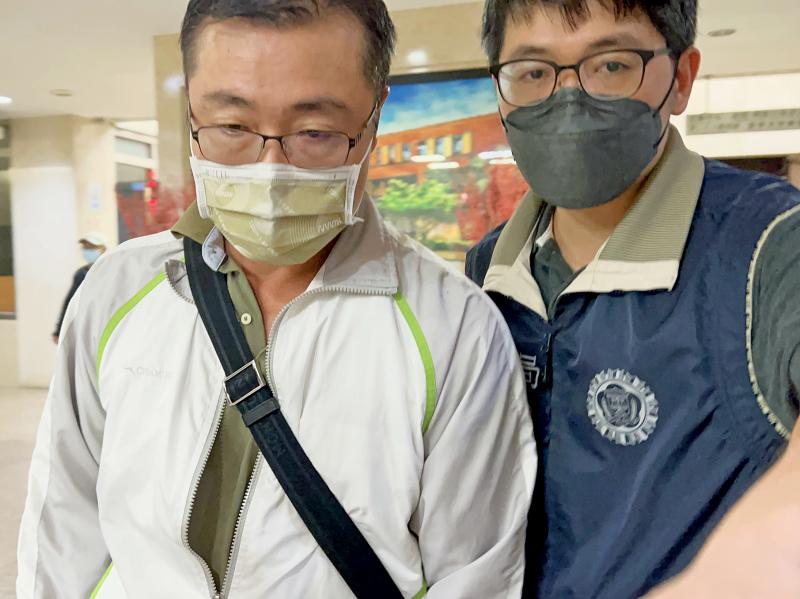Authorities on Tuesday raided the offices of the local unit of GigaDevice Semiconductor (Beijing) Inc (北京兆易創新科技) on suspicion of illegally recruiting Taiwanese technology talent to infiltrate Taiwan’s semiconductor industry.
Nine people, including Wang Wen-hao (汪文浩), a Taiwanese who heads GigaDevice Taiwan’s office in Taipei, along with the company’s chief accountant, surnamed Liu (劉), and other employees, were summoned for questioning, Taipei prosecutors said.
Wang was released on bail of NT$100,000 late on Tuesday night.

Photo: Chien Li-chung, Taipei Times
It is the first major investigation into talent poaching by suspected Chinese-funded businesses following the legislature’s passage on Friday of amendments to the National Security Act (國家安全法) which impose stiffer punishments on the illicit transfer or theft of core technologies.
According to business registry records, Wang in 2013 set up the Taiwan office as the local unit of GigaDevice Semiconductor (HK) Ltd (香港商香港商芯技佳易微電子), saying it would create jobs by conducting research and development into semiconductors and flash memory devices.
However, a preliminary investigation indicated that it was a ruse — that the Taiwan office is a shell entity for Wang and his deputies to penetrate Taiwan’s high-tech sector, aiming to poach Taiwanese talent in the IC design and memory device sectors, and to obtain proprietary technology.
The Taiwan office was set up to represent the Hong Kong firm, but both companies are controlled by GigaDevice Semiconductor (Beijing) Inc, contravening Taiwanese laws banning Chinese investment in Taiwan’s high-tech sector, court filings showed.
Chinese scientist and entrepreneur Zhu Yiming (朱一明) is the founder and owner of GigaDevice Semiconductor (Beijing), and he has total control and provides all the funding for the Hong Kong and Taiwan offices, the investigation showed.
Zhu reportedly has good connections to the Beijing government and close ties with the Chinese Communist Party (CCP).
He is Anhui Province’s representative to China’s National People’s Congress, and had studied and worked in the US under the Thousand Talent Plan jointly run by the CCP and China’s State Council, prosecutors said.
Since 2013, Wang has recruited more than 20 Taiwanese professionals, enticing them to work in China by offering them high annual salaries of NT$3 million (US$101,502) plus bonuses, prosecutors said.
One of them is an engineer surnamed Hsiao (蕭) who had worked on semiconductors at the Hsinchu Science Park, they said.
Prosecutors said that investigations of other cases have uncovered similar cases of Chinese firms skirting Taiwan’s restrictions by creating entities in Hong Kong which they use to set up business operations in Taiwan in light of Taiwan’s laxer measures governing Hong Kong firms.
However, the Hong Kong firms were later found to be directly owned and funded by Chinese entities, prosecutors said.
Employees at the Taiwan office who were questioned on Tuesday have been listed as persons of interest, prosecutors said, adding that they were summoned to provide information on the company’s operations, including money flow from China, who paid their salaries, and the people or channels through which high-tech materials and technologies are passed or processed.
Wang and his deputies are likely to face charges of contravening the Act Governing Relations Between the People of the Taiwan Area and the Mainland Area (臺灣地區與大陸地區人民關係條例), whose articles relating to national security had also been amended and passed by the legislature on Friday, prosecutors said.

A magnitude 4.9 earthquake struck off Tainan at 11:47am today, the Central Weather Administration (CWA) said. The hypocenter was 32.3km northeast of Tainan City Hall at a depth of 7.3km, CWA data showed. The intensity of the quake, which gauges the actual effect of a seismic event, measured 4 in Tainan and Chiayi County on Taiwan's seven-tier intensity scale, the data showed. The quake had an intensity of 3 in Chiayi City and County, and Yunlin County, while it was measured as 2 in Kaohsiung, Nantou County, Changhua County, Taitung County and offshore Penghu County, the data showed. There were no immediate reports of

Weather conditions across Taiwan are expected to remain stable today, but cloudy to rainy skies are expected from tomorrow onward due to increasing moisture in the atmosphere, according to the Central Weather Administration (CWA). Daytime highs today are expected to hit 25-27°C in western Taiwan and 22-24°C in the eastern counties of Yilan, Hualien, and Taitung, data on the CWA website indicated. After sunset, temperatures could drop to 16-17°C in most parts of Taiwan. For tomorrow, precipitation is likely in northern Taiwan as a cloud system moves in from China. Daytime temperatures are expected to hover around 25°C, the CWA said. Starting Monday, areas

Taiwan has recorded its first fatal case of Coxsackie B5 enterovirus in 10 years after a one-year-old boy from southern Taiwan died from complications early last month, the Centers for Disease Control (CDC) said yesterday. CDC spokesman Lo Yi-chun (羅一鈞) told a news conference that the child initially developed a fever and respiratory symptoms before experiencing seizures and loss of consciousness. The boy was diagnosed with acute encephalitis and admitted to intensive care, but his condition deteriorated rapidly, and he passed away on the sixth day of illness, Lo said. This also marks Taiwan’s third enterovirus-related death this year and the first severe

A Taiwanese software developer has created a generative artificial intelligence (AI) model to help people use AI without exposing sensitive data, project head Huang Chung-hsiao (黃崇校) said yesterday. Huang, a 55-year-old coder leading a US-based team, said that concerns over data privacy and security in popular generative AIs such as ChatGPT and DeepSeek motivated him to develop a personal AI assistant named “Mei.” One of the biggest security flaws with cloud-based algorithms is that users are required to hand over personal information to access the service, giving developers the opportunity to mine user data, he said. For this reason, many government agencies and